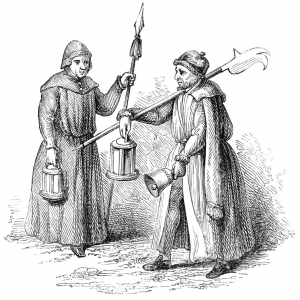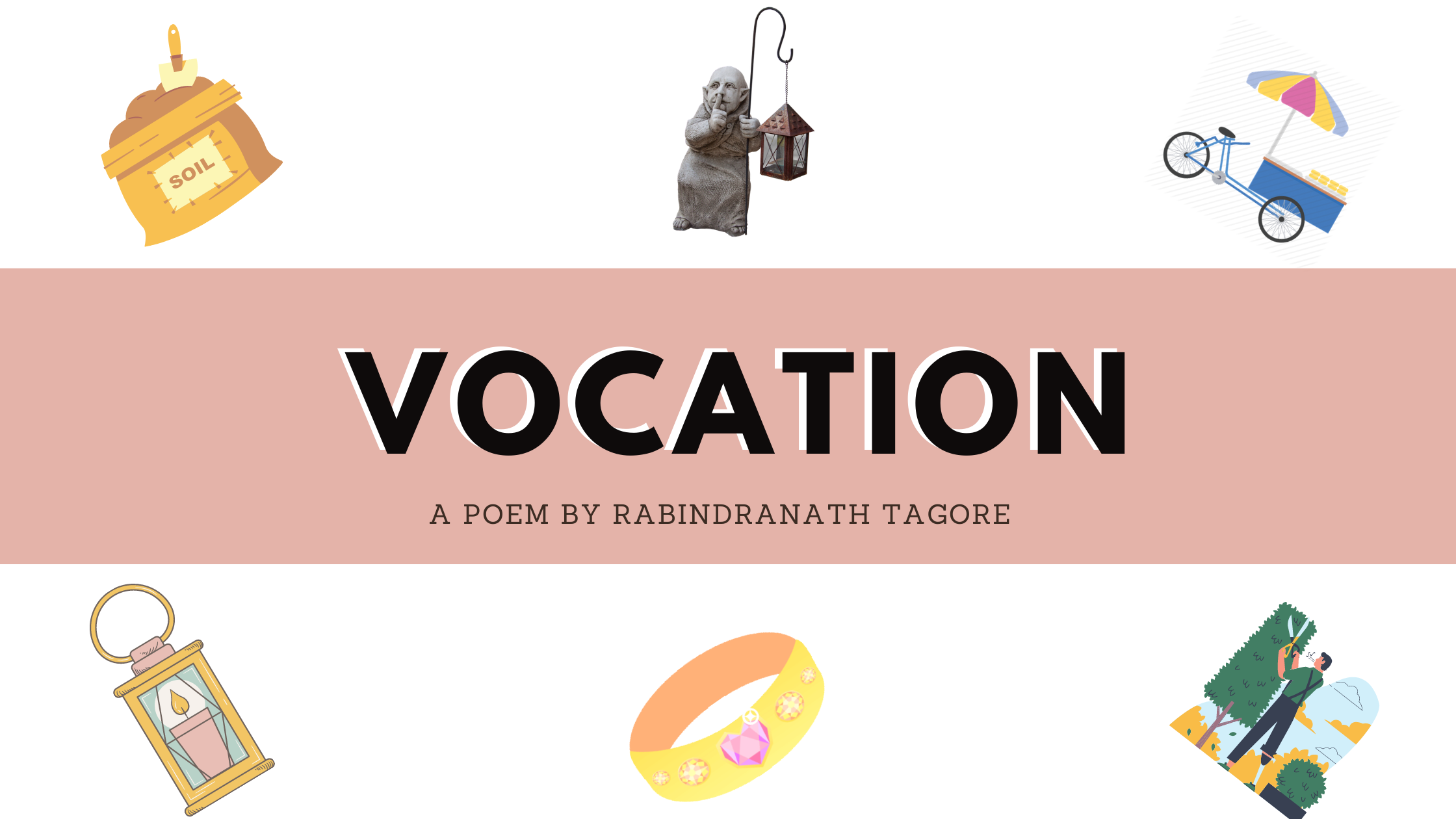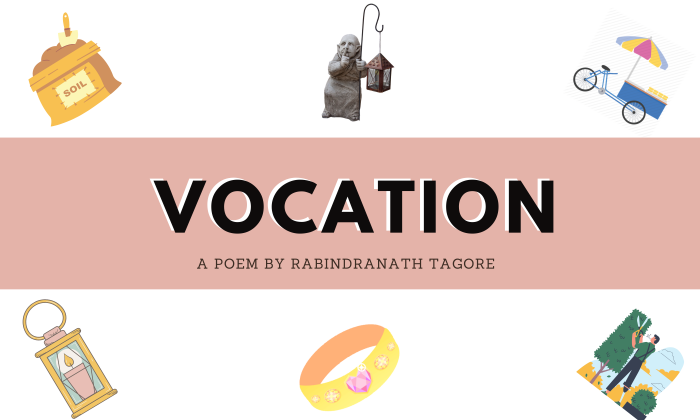Vocation – The Poem
When the gong sounds ten in the morning and I walk to school by our
lane.
Every day I meet the hawker crying, “Bangles, crystal
bangles!”
There is nothing to hurry him on, there is no road he must
take,
no place he must go to, no time when he must come home.
I wish I were a hawker, spending my day in the road, crying,
“Bangles, crystal bangles!”
When at four in the afternoon I come back from the school,
I can see through the gate of that house the gardener digging
the ground.
He does what he likes with his spade, he soils his clothes
with dust,
nobody takes him to task if he gets baked in the sun or
gets wet.
I wish I were a gardener digging away at the garden with
nobody to stop me from digging.
Just as it gets dark in the evening and my mother sends me to
bed,
I can see through my open window the watchman walking up and
down.
The lane is dark and lonely, and the street-lamp stands like
a giant with one red eye in its head.
The watchman swings his lantern and walks with his shadow at
his side, and never once goes to bed in his life.
I wish I were a watchman walking the streets all night,
chasing the shadows with my lantern.
My Story
I don’t know if it is a coincidence or what? This poem was a part of our curriculum at school. And you know this poem is such that it leaves a really-deep imprint on children.
We lived in a colony that had four gates and each gate had its own separate watchmen to guard, each during day and night. That very night, there was a guy who attempted a robbery at a neighbor’s house. The old man at the house saw him and alerted all the neighbors by shouting for help. Within a minute all the neighbors gathered. So, the naïve robber had no option but to flee.
Soon the robber was running to flee and residents of the society to catch him. They also alerted the watchman at the gate to catch him before he flees. He did nothing more than shouting “Wait! Wait!”. Whereas, he could have run after him, or thrown hurdles in front of him, or hit him with stones. But the robber was a young boy, he had speed. While the watchman was an old man.
The next day, there was a discussion about the incident in the society. The biggest question was about the escape. And when asked the watchman simply replied, “He was running too fast plus he also had a knife in his hand. And I am an old man with just a stick. I couldn’t have done much.” And to this, everyone agreed.

And then I thought to myself, ‘Rabindranath Tagore was right. Night-watchman is the most chilled-out job in the world. You are paid to just chill out at night, listen to some music, eat some snacks, and during the winters you can also do a bonfire around. There is no-one who wants to talk to you all the time. It is so peaceful. You can wander around as much as you want without your mother telling you to get inside. The best part is that there is no job responsibility.’
I was just too young to understand the petite salary they get. (Though, I haven’t grown-up enough yet to understand the value of pay packages).
Rabindranath Tagore

Rabindranath Tagore, born Robindronath Thakur, 7 May 1861 – 7 August 1941), also known by his pen name Bhanu Singha Thakur (Bhonita), and also known by his sobriquets Gurudev, Kabiguru, and Biswakabi was a polymath, poet, musician, artist, and Ayurveda-researcher from the Indian subcontinent. He reshaped Bengali literature and music, as well as Indian art with Contextual Modernism in the late 19th and early 20th centuries. Author of the “profoundly sensitive, fresh and beautiful verse” of Gitanjali, he became in 1913 the first non-European to win the Nobel Prize in Literature. Tagore’s poetic songs were viewed as spiritual and mercurial; however, his “elegant prose and magical poetry” remain largely unknown outside Bengal. He is sometimes referred to as “the Bard of Bengal”.
A Brahmo Hindu from Calcutta with ancestral gentry roots in Burdwan District and Jessore, Tagore wrote poetry as an eight-year-old. At the age of sixteen, he released his first substantial poems under the pseudonym Bhānusiṃha (“Sun Lion”), which were seized upon by literary authorities as long-lost classics. By 1877 he graduated to his first short stories and dramas, published under his real name. As a humanist, universalist, internationalist, and ardent anti-nationalist, he denounced the British Raj and advocated independence from Britain. As an exponent of the Bengal Renaissance, he advanced a vast canon that comprised paintings, sketches and doodles, hundreds of texts, and some two thousand songs; his legacy also endures in the institution he founded, Visva-Bharati University.
Tagore modernized Bengali art by spurning rigid classical forms and resisting linguistic strictures. His novels, stories, songs, dance-dramas, and essays spoke to topics political and personal. Gitanjali (Song Offerings), Gora (Fair-Faced), and Ghare-Baire (The Home and the World) are his best-known works, and his verse, short stories, and novels were acclaimed—or panned—for their lyricism, colloquialism, naturalism, and unnatural contemplation. His compositions were chosen by two nations as national anthems: India’s Jana Gana Mana and Bangladesh’s Amar Shonar Bangla. The Sri Lankan national anthem was inspired by his work.
To read more about Rabindranath Tagore, click here.
Vocation – Poem Analysis / Summary
This poem is a perfect tour into the mind of a child. This poem shows our inner-most needs. This poem is also a reminder to all the grown-ups that how these needs are curtailed by the parameters of societal norms.
A child finds the vocations of the street-hawkers, the gardeners, and the night-watchman so fascinating, just because these jobs give him the freedom to take the road he pleases to, soil his clothes under the sun and wander around at night. He does not care if the salaries these people are getting are a bare minimum. He knows one thing that these people manage their survival.
This poem is a good reflection of all our psyches when we were young, our inner-most desires for freedom. But as we grow up, we bury them under deep grounds and start running in the race to build a career, own a fortune, settle down. And despite these achievements, we remain unsatisfied. There is some sort of emptiness inside us. And most of us never realize what was it that we wanted all the way.
Vocation is another soul-stirring piece by Rabindranath Tagore.
To read more famous poems by the finest writers, click here.








